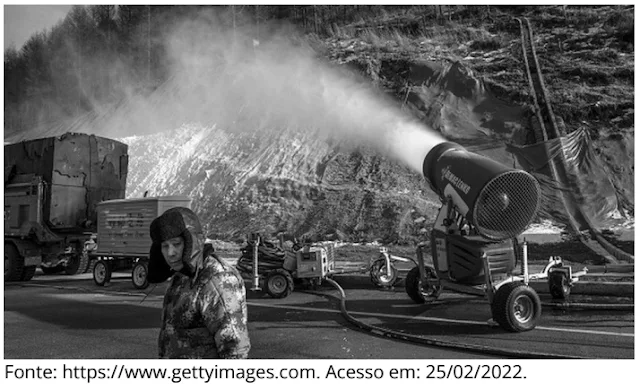De acordo com o texto: “Pequim insiste que a água usada para as Olimpíadas representa menos de 2% do abastecimento
BEIJING OLYMPICS:
WHAT’S WRONG WITH NATURAL SNOW?
By Wanyuan Song — Published 18th February
Why is Beijing using artificial snow?
The organizers have insisted on using it to "ensure the quality" at the Games remains high. Artificial snow was first used in winter sports in the 1980s. Vancouver 2010, Sochi 2014 and Pyeongchang 2018 all relied to some extent on artificial snow. Beijing has very limited winter snowfall, and the volume of artificial snow used at these Games has reached an unprecedented high of more than 90%. The Yanqing National Alpine Ski Center has relied almost entirely on the artificial variety. It is estimated that 49m gallons (222.8m liters) of water have been used to produce millions of cubic meters of snow.
Artificial v natural snow
Both are made of frozen water — but under the microscope the differences in their structure is clearly apparent. Natural snow starts as crystals in cold clouds, forming elegant sixsided symmetrical snowflakes that grow as they fall to the ground.
Which is better for winter sports?
With less air, and more ice, artificial snow is harder and wetter — and also icier, which makes it more suitable for some sports. It's also easier to maintain a consistent quality throughout competitions, providing as similar conditions as possible for all participants. (...) "Artificial snow offers consistent and predictable slope conditions," according to the International Olympic Committee (IOC). "The controllable and adaptable nature of manmade snow makes it a better fit than the natural version for developing ski courses for elite racing.".
How green is artificial snow?
The process of producing artificial snow is both energy and resourceintensive. This was an issue that concerned the IOC when it was evaluating candidate cities to host the 2022 Winter Olympics. It said Beijing's "reliance on artificial snowmaking would require the diversion of water from existing reservoirs and may impact other land uses". Beijing insists the water used for the Olympics accounts for less than 2% of the local supply. It also says the snow cannons being used need 20% less energy than ones used in previous games.
Referência: https://www.bbc.com/news/60406195.
Acesso em: 25/02/2022.
UFPel - QUESTÃO 32
De acordo com o texto: “Pequim insiste que a água usada para as Olimpíadas representa menos de 2% do abastecimento local. Também diz que os canhões de neve usados precisam de 20% de menos energia do que os usados nos jogos anteriores.” Tais declarações podem ser compreendidas como justificativa para críticas quanto ao:
(a) uso contínuo das reservas hídricas e agrícolas.
(b) uso indiscriminado do dinheiro público.
(c) uso indiscriminado de recursos energéticos e hídricos.
(d) uso indevido dos recursos agrícolas do país.
(e) uso inadequado dos recursos humanos disponíveis.
(f) I.R.
QUESTÃO ANTERIOR:
GABARITO:
(c) uso indiscriminado de recursos energéticos e hídricos.
RESOLUÇÃO:
Não temos resolução para essa questão! Você sabe explicar? Copie o link dessa página e envie sua resolução clicando AQUI!
PRÓXIMA QUESTÃO:
QUESTÃO DISPONÍVEL EM:








